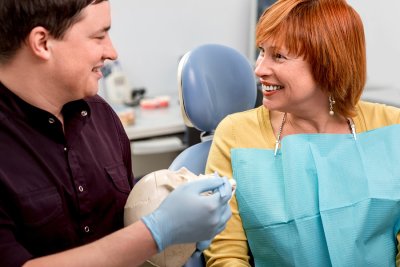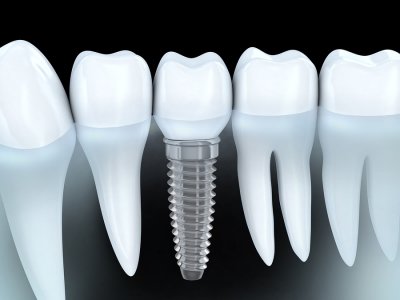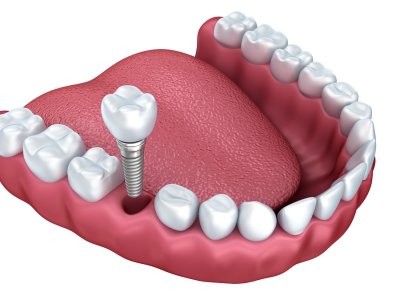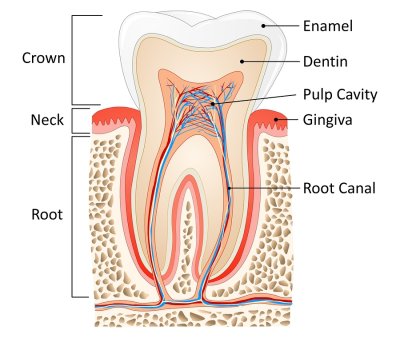-
Healing from Dental Implants
Dental implants can be healing in many ways, because they restore missing teeth permanently to improve your oral health and your self-confidence. Implant dentistry is changing lives across the world, and though it requires a little bit of recovery time, patients are forever changed for the better after their implant surgery.
Healing Time

The amount of time it takes to heal from a dental implant surgery depends on the severity of the surgery, the patient’s bone quality, and the quality of the aftercare. Typically, healing time will be anywhere from two to four months. However, the more involved an implant surgery was—potentially due to additional teeth extractions, bone grafts, or complications—the longer the healing time will be. Also, if a patient has difficulty healing from invasive procedures, possibly due to a blood or immune disorder, the healing time may be longer than normal.
Proper Aftercare
A patient’s care after an implant procedure encompasses everything from his oral hygiene to his overall health. If a patient follows the dentist’s instructions exactly and maintains healthy habits, healing time should go smoothly.
Dental Checkups
In the following weeks and months after an implant procedure, the patient will visit the dentist several times. These checkups will assess how well the implants are fusing to the jaw. They will also determine how well the patient’s gums and mouth are healing. Once the jaw and gums have sufficiently healed, the dentist will start to incorporate the dental restorations. Often, implant-supported dentures are able to be loaded onto the implants within a day or two of the surgery. However, this may not always be possible, and it is completely normal to finish healing before a dentist will fully load dentures onto an implant.
If you have been curious about implant dentistry near Hazlet, call Glenwood Premier Dental at (732) 264-4477. We will get you in for a comprehensive dental exam and discuss all of the options available to you . When you want a compassionate and understanding dentist and staff, you know to call Glenwood Premier Dental.
-
How Missing Teeth Affect Your Health
As you can see in this video, people with missing teeth and dentures tend to eat softer food that has been heavily processed. As any doctor and dentist will advise, this type of diet is unhealthy toward a patient’s overall health and wellbeing.
When someone has missing teeth, they often find it difficult to eat healthier foods like vegetables, fruits, and meats. These foods are essential to maintaining a healthy lifestyle, though they may be inaccessible to you if you have missing teeth or poorly fitted dental restorations. Your dentist can help you explore restorative care options that will more easily allow you to eat healthy foods.
At Glenwood Premier Dental , we believe that good dental health can profoundly impact your overall health. Call us at (732) 264-4477 to schedule a consultation with the best dentists in Hazlet so you can lead a full and healthy life.
-
What to Expect from Dental Implants
If you have a damaged or decayed tooth that needs to be removed, your dentist may recommend a dental implant. This type of dental restorative care can help ensure that your tooth loss doesn’t lead to bone loss in your jaw, and will also anchor your dental crown in place to fill the gap in your teeth.
Before a Dental Implant Procedure

Dental implants require outpatient dental surgery, and the process can take as long as several months from start to finish. For patients whose jawbone lacks sufficient density or strength for an implant, a bone graft may be necessary. This procedure involves removing a piece of bone from another area of your jaw or another bone in your body and transplanting it to the area where the implant will be placed.
During a Dental Implant Procedure
For the first step of the implant dentistry procedure, your oral surgeon will expose the bone in your jaw, drill a hole, and place the metal implant post . After this, your dentist will provide you with a temporary partial denture to conceal the gap in your teeth. Next, you will wait for the jawbone to grow around and merge with the surface of the implant to provide a stable base for your crown. Once the bone growth is complete, you may undergo a minor surgery to place an abutment to which the crown can attach.
After a Dental Implant Procedure
Once the implant is placed, you may experience facial swelling and bruising, pain around the implant site, and some minor bleeding. Your doctor may recommend eating soft foods after each stage of the procedure and prescribe antibiotics or pain medications. After the abutment is in place and your gums have healed, your artificial tooth will be permanently attached to the implant.
Glenwood Premier Dental offers the latest technology for implant dentistry near Hazlet. Some of our other dental services include Zoom Whitening, Invisalign, and laser dentistry. Contact us today at (732) 264-4477 to schedule an appointment.
-
Are You a Candidate for Dental Implants?
Implant dentistry is ideal for individuals who want to permanently restore missing teeth. Dental implants consist of tiny titanium screws that a dentist surgically implants beneath your gums. Dental implants fuse with existing healthy jawbone and even stimulate the growth of new bone tissue. After a brief healing time, dental implants are covered with dental crowns, bridges, or dentures. Read on to find out why you may be a good candidate for implant dentistry if you have sufficient healthy bone, are in good overall health, and are committed to maintaining your dental implants.
You Have Sufficient Healthy Jawbone

Implant dentistry requires patients to have sufficient healthy jawbone. In order for dental implants to fuse with your bone tissue, you must have a minimum amount. However, if your periodontist advises you that your jawbone has deteriorated due to your periodontal disease, you can consider bone grafting procedures. With bone grafting, a dentist transplants healthy bone tissue to stimulate growth and make room for dental implants .
You Are in Good Overall Health
If you engage in high risk activities that compromise your overall health, you are probably not a good candidate for dental implants. Even the best dentist cannot place dental implants if a patient smokes heavily. Heavy smoking hinders the healing process, which means your dental implants may not be successful.
You Are Committed to Maintaining Your Dental Implants
To be a good candidate for implant dentistry, you must be committed to maintaining your dental implants. That means you should be prepared to avoid chewing on hard foods and dedicated to practicing good oral hygiene at home. You should also eliminate habits that can cause gum disease, like drinking heavily or using drugs.
To find out more about implant dentistry in Hazlet and determine if you may be a good candidate for dental implants, contact Glenwood Premier Dental by calling us at (732) 264-4477. Our dentists are dedicated to helping you achieve a full and beautiful smile. Visit us online or call us to learn more about dental implants.
-
Spotlight on Single Tooth Dental Implants
 Implant dentistry is ideal for individuals who are missing one or more teeth due to gum disease, decay, or trauma. Millions of Americans turn to restorative care for permanent solutions to their missing teeth.
Implant dentistry is ideal for individuals who are missing one or more teeth due to gum disease, decay, or trauma. Millions of Americans turn to restorative care for permanent solutions to their missing teeth. Implant dentistry refers to a special kind of restorative care. Dental implants are tiny titanium screws that a dentist surgically implants in a patient’s jawbone. This method of restorative care works because the tiny screws act as roots for missing teeth. Dental implants can be covered with dentures, dental crowns, or a dental bridge. While implant dentistry was formerly reserved for individuals who were missing multiple teeth, a dentist now suggests dental implants for anyone who wants a permanent solution for a missing tooth. After the initial surgery, which requires two to six months to completely heal, your dentist will place a dental crown or other restoration. You will then have a full set of teeth that functions and looks just like your smile did before you lost a tooth.
For everything you need to know about implant dentistry near Hazlet , look no further than Glenwood Premier Dental. You can reach us at (732) 264-4477 to learn more about implant dentistry and schedule a consultation to find out if dental implants may be right for you.
-
What to Consider When Choosing Between Dentures and Dental Implants
When you have one or more missing teeth it is very important to seek treatment. There are many options to choose from when considering how to replace missing teeth. Your dentist in Hazlet offers services such as implant dentistry and dentures . There are different benefits for each option, as well as certain drawbacks. Continue reading to learn what you should consider when choosing a treatment for tooth replacement.
Forms of Attachment

Dentures and implants benefit your mouth by supporting its structure with tooth-like replacements. Dentures are meant to fill in gaps between natural teeth and restore the mouth’s shape. Implants are designed to replace a single tooth while keeping the jaw stimulated .
Either way, each device requires a way to stay attached to your gums or jaw. Partial dentures are supported by metal clasps that attach to your existing teeth. They require the health of the gums they rest upon, as well as surrounding teeth. A dental implant is more invasive, as it is placed into your jaw as a permanent fixture, acting as a tooth’s root.
Functionality
It can feel challenging to perform normal tasks, such as speaking and eating, while wearing dentures. They may have a tendency to slip out of place or become uncomfortable. Permanent implants allow more ease of speech, as well as more comfort while eating. Dental implants are discreet because they mimic natural teeth. Complete or partial dentures may be more apparent both to the wearer and others. On the other hand, dentures can be adjusted or modified more easily because they are removable.
Cost and Durability
Over time, dentures may put stress upon the supporting teeth and gums. Implants act on their own as a form of replacement, while simultaneously preserving the bone and gum tissue. Dentures need to be replaced every five years or so, whereas implants may keep up for 15 to 20 years. Lastly, dental implants will likely be more expensive than dentures.
Be sure to consult with your dentist about which treatment is best for you and your situation. The dentists at Glenwood Premier Dental provide personal and expert implant dentistry care. Call us at (732) 264-4477 to learn more, or visit us online .
-
Signs of Nerve Damage in Your Teeth
 Nerve damage can occur when the dental pulp inside your tooth is infected or exposed. Your teeth are made of dentin, which is covered by the enamel you can see. Under the dentin is the dental pulp, which is a soft tissue containing nerves and blood vessels. When injured or damaged, these nerves can cause you a lot of pain and require immediate treatment. If you think you have nerve damage, it is important to see your emergency dentist in Hazlet to avoid complications. Continue reading to see if your teeth have signs of nerve damage.
Nerve damage can occur when the dental pulp inside your tooth is infected or exposed. Your teeth are made of dentin, which is covered by the enamel you can see. Under the dentin is the dental pulp, which is a soft tissue containing nerves and blood vessels. When injured or damaged, these nerves can cause you a lot of pain and require immediate treatment. If you think you have nerve damage, it is important to see your emergency dentist in Hazlet to avoid complications. Continue reading to see if your teeth have signs of nerve damage. Injuries
Receiving a traumatic blow to the jaw or teeth, which is common in sports, can lead to nerve damage. It is important to notice if you have any broken or cracked teeth, as well as severe pain following the accident. A cracked crown can cause the tooth’s nerves to be exposed . There is also a possibility of a root fracture, which requires immediate dental attention.
Severe Decay
If you have noticed advanced decay on any of your teeth, be sure to get to the dentist. Decay can wear your tooth down to the nerve and cause the dental pulp to be exposed. Exposure can lead to an infection in your tooth’s nerves. You will notice pain and sensitivity when breathing or ingesting cold or hot liquids and foods.
Abscessed Tooth
Swelling of the face or jaw around a painful tooth may suggest to you that you have an abscessed tooth. This is caused by an infection at the root, most often caused by decay or injury. If you think you have an abscess this is a good indicator of nerve damage. Blood flow and cellular activity increases around damaged or dead dental pulp, causing pressure to build up. This requires immediate dental attention.
A dental exam is required to address the extent of your nerve damage, as well as what kind of treatment is most appropriate. You will receive quality care from the staff at Glenwood Premier Dental during your consultation. If you have questions, call us at (732) 264-4477 or visit us online for more information about our services.
-
Answering Common Questions About Implant Dentistry
Dental implants are commonly used to replace missing teeth. They usually consist of three parts: a post or screw, an abutment, and a crown. The screw is attached to the patient’s jawbone. Over time, the bone will bond with the implant. A small abutment is then placed over the post to connect it to the crown, which is the visible part of the replacement tooth. If you have lost one or more teeth as the result of disease or trauma, a dentist can advise you on whether dental implants would be a good option for you. Here are a few things you should know about the procedure.
Attaching the Post

First, the dentist will insert a small post or screw into your jaw. This will need to heal and fuse with the surrounding bone before the crown can be added. During the recuperation process, the dentist may recommend a diet of liquids and soft foods.
Allowing Osteointegration to Occur
The next stage of the process is known as osteointegration . The bone surrounding the implant will continue to grow and begin to bond with the inserted post. The fusion of bone and implant will help to hold the replacement tooth securely in place. The patient may need to wait until the bone has fused before the crown can be attached. This process can take several months. However, in some cases, the dentist can insert the implant and attach the crown in the course of a single appointment.
Attaching the Dental Crown
Finally, the dentist will attach an artificial tooth, known as a dental crown. Dental crowns are custom made to match the color, size, and shape of each individual patient’s teeth. If necessary, the dentist may fit you with a temporary crown or denture, to enable you to speak and eat without obstructions, while the dental technicians complete the construction of the permanent crown.
Here at Glenwood Premier Dental, we offer a range of restorative care services, including implants. To find out more about whether you would be a good candidate for implant dentistry near Hazlet , call us at (732) 264-4477, or visit our website.
-
Exploring the Dental Implant Procedure
Certain procedures that your Hazlet dentist can perform may impact both your appearance and your ability to chew and speak efficiently. Dental implants and dentures are both examples of these kinds of procedures. If your dentist has recommended dental implants, read this brief article for information on what to expect.
Meeting with Your Dentist
The first step in the dental implant procedure is determining whether or not this particular treatment is optimal for your needs. Dental implants may be a suitable treatment for missing teeth, but it is not the only one. Only your dentist can help you determine what the ideal treatment would be. Your dentist will evaluate your gums, jaws, and teeth to assess whether or not you are an ideal candidate for dental implants.
 Three Steps of the Process
Three Steps of the Process Once your dentist determines that this is the ideal treatment for your needs, you will go through the three stages of dental implant procedure . The first step in this process is to replace the root of your missing tooth with a surgical implant under your gum. You will give this time to heal and then return to have a post or abutment installed. The abutment attaches to the implant through the gum, which heals around the post. Your oral surgeon can then use the exposed post to attach a dental crown or prosthetic tooth.
Success Rates
Dental implant procedures typically enjoy a very high success rate. In some rare cases a patient’s mouth does not accept the dental implant. When this occurs, your dentist will remove the failed implant and determine whether or not a replacement dental implant should be inserted.
Would you like to learn more about the dental implant procedure? If so, contact Glenwood Premier Dental . We are proud to call ourselves the Hazlet area’s home for cosmetic, implant, and laser dentistry. Please give us a call at (732) 847-9039 or visit our website to learn more about our many dental procedures. If you live in the area, feel free to stop in and see us today.
